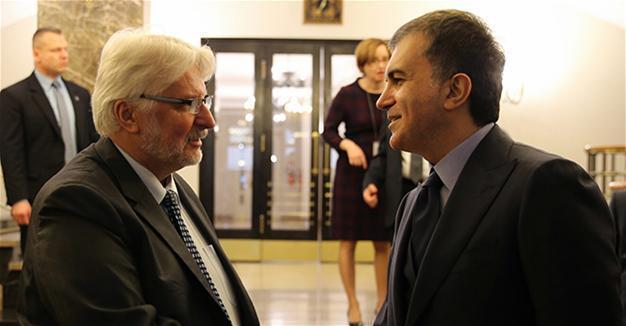No summit, no progress: Turkey to EU
Serkan Demitaş - WARSAW

AA photo
The only way to jumpstart stalled Turkey-EU ties is to hold a high-level summit between the two parties, Turkish EU Minister Ömer Çelik has said, suggesting that it should occur in the first half of 2017 and produce concrete results in Turkey’s accession process, as well as a visa exemption to Turkish nationals.
“There can be no progress [in ties between Turkey and the European Union] without a proper Turkey-EU summit,” Çelik told a group of journalists travelling with him to Warsaw for official talks on Feb. 22.
Turkey has long called on the EU to hold a high-level summit to revise issues of concern to both sides, especially on the implementation of the March 18, 2016, migrant agreement. Prime Minister Binali Yıldırım conveyed Ankara’s message to the EU on the need to update the political framework during a trip to Malta, the EU’s term president, last week.
Turkey’s message included two important points, Çelik said. “First, this summit should be held in the first of half of this year. Second, it should not introduce theoretical perspectives but concrete progress. This summit should not be limited to issues related to Turkey’s struggle against terrorism or migration. We want to see what can be produced in Turkey’s accession process, as well as grant visa exemptions to Turkish nationals.”
Although Turkey has fulfilled its obligations stemming from a March 2016 agreement, it needs to be seen whether the EU really wants to continue the deal or wishes to abandon it, Çelik said.
Recalling that the EU was in a process of abolishing visa requirements for the nationals of Ukraine, Georgia and Kosovo, Çelik said: “If the criteria is about security, there is no doubt that Turkey is much stronger in fulfilling it. There is no solid reason for not providing a visa exemption to Turkey.”
Turkey removes ISIL from NATO border
Çelik also said Turkey’s ongoing struggle against the Islamic State of Iraq and the Levant (ISIL) in al-Bab, Manbij and elsewhere in Syria was part of an effort to ensure the security of European capitals from terrorists.
“Turkey was able to clear its borders of DAESH all alone while a coalition of 60 countries failed to do so. These borders are NATO borders as well and have been cleared of terrorists,” he said, using an Arabic acronym for ISIL.
No invitation to Turkey to Rome
Çelik also drew attention to the EU’s decision not to invite negotiating countries to the 60th anniversary of the Rome Treaty, which will be held in Rome on March 25.
Expressing Ankara’s disturbance, Çelik said: “They said they have not invited the United Kingdom either. This reflects the EU’s lack of vision. Putting countries that are negotiating to be admitted to the EU and, therefore see their future inside the EU, and the U.K., which decided to exit it, into the same basket is a clear collapse of vision.”
The meeting, which is being organized by European Council President Donald Tusk, will be attended by the heads of state and governments of EU countries on March 25 in Italy.
No meeting with Kati Piri
Ties between Ankara and Brussels became increasingly tense last year after the European Parliament issued a recommendation to the EU to cut ongoing negotiations with Turkey upon rapporteur Kati Piri’s report.
When asked about Piri’s presence in Ankara for official talks, Çelik said he refused to give an appointment to her on the grounds that she was solely reflecting the position of the Peoples’ Democratic Party (HDP) and was failing to draft a balanced text on Turkey.
“She should not report as if she is the spokeswomen of the HDP. Her reports are only the translation of HDP officials’ routine statements into English,” Çelik said, calling on her to contribute to the Turkey-EU relationship and not damage it.
Still, Çelik said Turkey’s new EU ambassador, Faruk Kaymakçı, had related that Piri will exercise a more balanced position in her future works.
Memo on referendum extended to EU
Çelik also said a note on Turkey’s upcoming referendum had been given to EU officials during Yıldırım’s meetings last weekend in Germany. The EU commissioner for migration, Dimitris Avramopoulos, demanded information on the content of the constitutional changes at a meeting that took place at around midnight, Çelik said, underlining that the note was prepared and given to EU officials the following morning.
